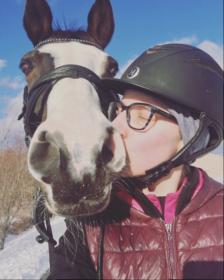Currently not - have discussed with vet and while he agrees symptoms could be consistent with ulcers, the fact that the symptoms presented immediately (within hours) of the vaccine administration, ulcers are not a likely candidate. We will keep them in the list of possible suspects if symptoms continue.
Next step is likely another fecal, running more blood, perhaps another dose of IV hydration to boost her fluid levels. Her poop is somewhat dry - not alarmingly so to look at, but smaller, slightly harder balls than usual. During her initial rectal exam vet was concerned about the texture and at that point she hadn’t really been pooping as much. After her IV fluids last week she had several nice soft normal poops with zero discomfort, and she has been pooping a much more typical amount as she’s increased her food and water intake - not every poop seems to cause discomfort, but there is a definite pattern to her being quiet/normal (ish), then looking distressed, looking at her sides, sometimes lying down and groaning, which seems to improve at least somewhat after a poop.
I appreciate the suggestions though - and I have continued to run everyone’s thoughts by my vet. He is always extremely open to questions and suggestions and does take them seriously.
While we do appear to be continuing overall improvement, I’m sure the dear old gal would appreciate some spare jingles if anyone has any.
Picture of her very very kissable nose from 6 or so weeks ago to put a face to all the poop anecdotes  [ATTACH=JSON]{“data-align”:“none”,“data-size”:“medium”,“data-attachmentid”:10378003}[/ATTACH]
[ATTACH=JSON]{“data-align”:“none”,“data-size”:“medium”,“data-attachmentid”:10378003}[/ATTACH]


 It is a slow recovery, but today is the second day I have actually witnessed her drinking with my own eyes! :yes:
It is a slow recovery, but today is the second day I have actually witnessed her drinking with my own eyes! :yes:
